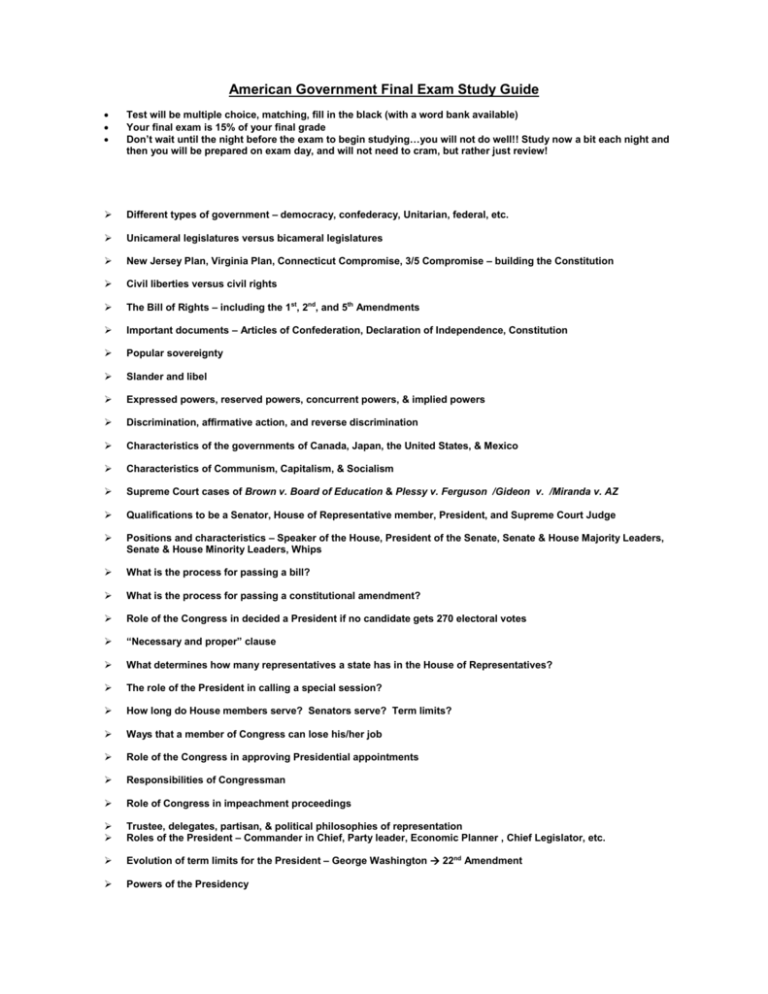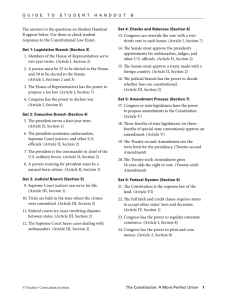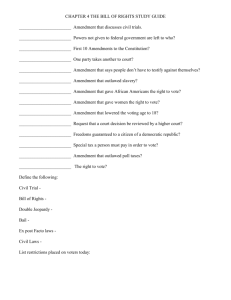Political Science Final Exam Study Guide
advertisement

American Government Final Exam Study Guide Test will be multiple choice, matching, fill in the black (with a word bank available) Your final exam is 15% of your final grade Don’t wait until the night before the exam to begin studying…you will not do well!! Study now a bit each night and then you will be prepared on exam day, and will not need to cram, but rather just review! Different types of government – democracy, confederacy, Unitarian, federal, etc. Unicameral legislatures versus bicameral legislatures New Jersey Plan, Virginia Plan, Connecticut Compromise, 3/5 Compromise – building the Constitution Civil liberties versus civil rights The Bill of Rights – including the 1st, 2nd, and 5th Amendments Important documents – Articles of Confederation, Declaration of Independence, Constitution Popular sovereignty Slander and libel Expressed powers, reserved powers, concurrent powers, & implied powers Discrimination, affirmative action, and reverse discrimination Characteristics of the governments of Canada, Japan, the United States, & Mexico Characteristics of Communism, Capitalism, & Socialism Supreme Court cases of Brown v. Board of Education & Plessy v. Ferguson /Gideon v. /Miranda v. AZ Qualifications to be a Senator, House of Representative member, President, and Supreme Court Judge Positions and characteristics – Speaker of the House, President of the Senate, Senate & House Majority Leaders, Senate & House Minority Leaders, Whips What is the process for passing a bill? What is the process for passing a constitutional amendment? Role of the Congress in decided a President if no candidate gets 270 electoral votes “Necessary and proper” clause What determines how many representatives a state has in the House of Representatives? The role of the President in calling a special session? How long do House members serve? Senators serve? Term limits? Ways that a member of Congress can lose his/her job Role of the Congress in approving Presidential appointments Responsibilities of Congressman Role of Congress in impeachment proceedings Trustee, delegates, partisan, & political philosophies of representation Roles of the President – Commander in Chief, Party leader, Economic Planner , Chief Legislator, etc. Evolution of term limits for the President – George Washington 22nd Amendment Powers of the Presidency 25th Amendment – giving up the Presidency – how can it be done? Pocket vetoes, vetoes, Congressional overrides Who elects the President of the United States? Requirements for being President How does a person become President? What state has the most electoral votes? The role of the President’s Cabinet Presidential line of secession – in case the President is unable to serve Executive Agreements, Treaties, Executive Orders, & Appointments – what are each of these? War Powers Act, Council of Economic Advisors, Office of Management & Budget, & The National Security Council What is the “Supreme law of the land”? Role of the Chief Justice of the Supreme Court 13th Amendment, 14th Amendment – did what? Due Process Rights of the accused – double jeopardy, writ of habeas corpus, no bills of attainder, grand juries, 6th Amendment, 5th Amendment (Miranda Rules, ex post facto laws Various types of courts What is a bench trial? Exclusionary Rules – in what situations can evidence be used Jurisdiction – original vs. appellate jurisdiction – which one(s) does the Supreme Court have? Know what types of punishments are legal/illegal. Know what types of searches are legal/illegal Roe v. Wade, Gideon v. Wainwright, Katz v. United States, Marbury v. Madison – what did these Supreme Court cases decide? Voting qualifications – 15th Amendment, 19th Amendment, 24th Amendment, 26th Amendment What can be required or a person to vote? What cannot be required of a person in order to vote? How do we determine how people vote in certain elections? Are there any trends in how different groups vote? Religious groups, age groups, genders, upper/lower class, race? What is the biggest determinant in how people vote? What are political parties? What functions do they serve? Why do we have a two party system in our country? What are the advantages/disadvantages to a multiparty system (more than 3), what are the advantages/disadvantages of a one party system? Who gives money to candidates? What are PAC’s, what are temporary organizations? Democrats vs. Republicans – what do they typically believe? Where do they typically get their support? Federalism 5 classification of aliens Duties of all citizens -- National Origins Act of 1920, quota 3 waves of immigration to US -- Early system of law 2 main arrival points to US -- Facts about the judicial branch Facts about the judicial branch






